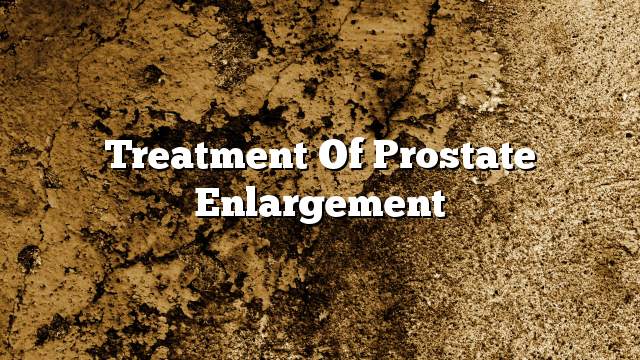The concept of prostate
Is a hormonal fibrous gland, located around the urethra, at the neck of the bladder of the man to secrete the semen with which the sperm emanate during the ejaculation.
Diseases affecting the prostate gland
Prostate inflammation
This inflammation occurs as a result of the infection of the urinary tract bacteria, and symptoms:
- Feeling cold and fever.
- Pain in the lower abdomen and anus.
- Difficulty and frequency of urine.
- Poor or slow urine flow.
- Feeling incomplete emptying the bladder.
- Urgent need to urinate.
- Go to urinate often at night.
- There is a urine stream that starts and stops.
- Continuation of urine evasion.
- Go back to urinate again in the finished minute.
- Heartburn when urinating.
- Inflammation of the epididymis and testicles sometimes.
- Inflammation of the prostate due to sexual contact due to chlamydia, gonorrhea and urticaria. The symptoms of this infection are: feeling cold, fever, low back pain, pubic bone and pelvic floor, and burning when urinating.
Chronic prostatitis
Prostate enlargement
Caused by prostatitis or benign and non-benign growth of its tissues, it is one of the causes of blockage of the bladder neck.
Causes of bladder blockage
- Prostate enlargement.
- Bladder stones.
- The presence of scars in the urethra.
- Bladder tumor.
- Tumors of the uterus, cervix, prostate and rectum.
- Kidney disease.
Symptoms of bladder blockage
- Lack of urine flow.
- Urination is delayed when needed.
- The urine is cut off
- Abdominal pain.
- Pain when urinating.
- Repeat urine.
- Feeling the need to urinate constantly
There are some questions to ask yourself to start with the swelling of the rosettes and choose the appropriate treatment:
How severe are the symptoms?
Do symptoms prevent you from doing things you enjoy?
Do they not seriously affect your quality of life?
Are the symptoms getting worse?
Are you willing to accept some small risks to get rid of your symptoms?
Do you know the risks associated with each treatment?
Is it time to do something?
Treatment of prostatic hyperplasia
- Alpha blockers: These drugs do not reduce the size of the prostate, but they are very effective in relieving the symptoms. It works by relaxing the muscles around the prostate and the bladder neck, so the urine can flow more easily. These drugs work quickly, so symptoms improve within a day or two.
- TUMT (transurethral microwave thermotherapy): This light-to-moderate light therapy reduces urinary frequency, urgency, stress, and intermittent flow – but does not correct any problems emptying the bladder.
- TUNA (transurethral radio frequency needle ablation): This procedure also destroys prostate tissue to improve urinary flow and relieve symptoms.
- Prostatic stents: In some cases, a chip of small metal coils can insert the stent into the urethra to enlarge it and keep it open. Stents are installed in the outpatient clinic under local or spinal anesthesia.
- For most men with high prostatic hyperplasia, surgery relieves symptoms – each process has risks and benefits and varies with the type of surgery. The patient should discuss it with your doctor. After careful assessment of your condition and general health status, your doctor will advise you on the best for you.
1-TURP (transurethral resection of the prostate): This is the most common surgery for prostatic hyperplasia, and is one of the most effective procedures to reduce symptoms.
2-TUIP (transurethral incision of the prostate): This procedure involves cutting the prostate instead of removing the prostate tissue. This shear or prick works to relieve pressure on the urethra, making urination easier. Patients are allowed to return home the same day and wear a catheter for a day or two.
3. Laser surgery: This procedure uses high-energy laser to destroy prostate tissue. This is done under general anesthesia and may require overnight stays in the hospital. It is characterized by immediate removal of symptoms, but men may suffer from painful urination for a few weeks.
Many people rely on different types of herbs to treat the prostate, but there are not enough studies to prove the effectiveness of these herbs to treat the prostate
Note: The subject of prostate enlargement treatment is not a health reference, please see your doctor.
